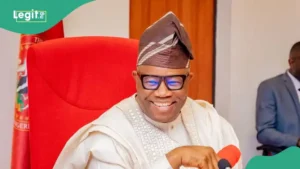The Christian Association of Nigeria (CAN) has dismissed calls for Senate President Godswill Akpabio to resign following allegations of sexual harassment made by Senator Natasha Akpoti-Uduaghan. The controversy has ignited fierce political debate, with growing concerns over regional tensions and power struggles ahead of the 2027 elections.
CAN insists that calls for Akpabio’s resignation are premature and politically motivated. The association argues that no substantial evidence has been presented and warns against making hasty conclusions. Reverend Joseph Hayab, Chairman of CAN in the 19 Northern states and the Federal Capital Territory, urged caution, calling on respected elders to intervene before the situation escalates further.
According to Hayab, the matter must be handled responsibly to prevent unnecessary division. He emphasized that both Akpabio and Natasha Akpoti-Uduaghan have respected figures they can turn to for mediation. CAN warns that taking sides without concrete proof could inflame tensions and distract lawmakers from pressing national issues. The association also cautions against media sensationalism, stating that reckless reporting could worsen existing political and regional divides.
PANDEF has accused the Arewa Consultative Forum (ACF) of exploiting the controversy for political gain. The Niger Delta group believes that ACF’s stance on the issue is part of a larger strategy to discredit Southern political leaders and push for a Northern presidency in 2027. PANDEF alleges that the ACF’s argument is an attempt to manipulate the narrative and create unnecessary division between Northern and Southern lawmakers.
Dr. Obiuwevbi Ominimini, National Publicity Secretary of PANDEF, condemned the ACF’s position, calling it a dangerous attempt to stir political instability. He recalled that during the 8th Assembly, a Southern senator was suspended under a Northern Senate President, yet no regional group interfered. PANDEF insists that legislative matters should be handled within the framework of the National Assembly without external political interference. The group warns that allowing political groups to weaponize such cases could set a dangerous precedent that undermines national unity.
The controversy surrounding Akpabio has placed the National Assembly at the center of political debate. Lawmakers are now divided, with some calling for an investigation while others insist that the allegations should not be used to discredit Akpabio’s leadership. Critics argue that the case highlights deeper issues within Nigeria’s political structure, where allegations are often used as tools for political maneuvering.
Senator Natasha Akpoti-Uduaghan’s husband, Emmanuel Uduaghan, has spoken publicly on the issue. The Alema of Warri Kingdom, Delta State, confirmed that his wife informed him about the allegations from the start. He stated that he had personally approached Akpabio in a respectful manner and urged the Senate President to extend the same respect to his wife. His remarks suggest an attempt to resolve the matter amicably while reinforcing the seriousness of the allegations.
As the debate rages on, political analysts warn that the controversy could shape the future of Nigerian politics. The case has moved beyond the allegations themselves and has become a test of power dynamics in the Senate. With CAN and PANDEF taking strong stances and the ACF pushing back, the situation has evolved into a full-blown political battle.
Observers believe that how this case is handled could set a precedent for similar allegations in the future. The controversy is not just about Akpabio or Natasha Akpoti-Uduaghan—it is now a struggle over political influence, regional control, and the balance of power within Nigeria’s leadership. The outcome of this high-stakes political drama will likely have lasting implications, shaping alliances and determining the direction of the 2027 elections.
Nigerians are closely watching as events unfold. While some believe the allegations should be thoroughly investigated, others argue that the case is being exaggerated for political reasons. The coming weeks will determine whether the controversy fades away or escalates into a defining moment in Nigeria’s political landscape.


